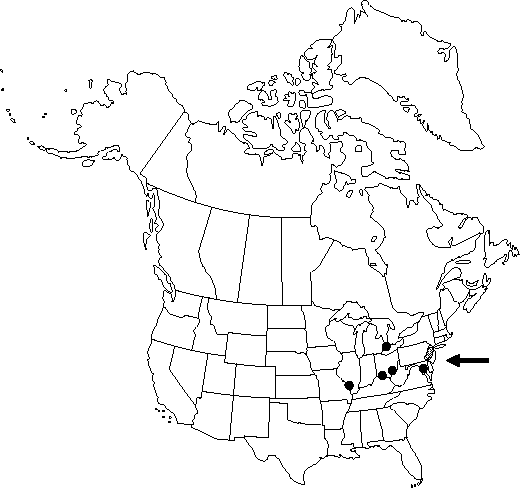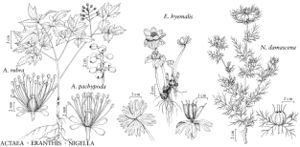Difference between revisions of "Eranthis hyemalis"
Trans. Linn. Soc. London 8: 304. 1807.
FNA>Volume Importer |
FNA>Volume Importer |
||
| Line 33: | Line 33: | ||
}}<!-- | }}<!-- | ||
| − | --><span class="statement" id="st- | + | --><span class="statement" id="st-undefined" data-properties=""><b>Leaves </b>basal, 3–10 cm. <b>Leaf</b> blade 3–5 cm diam.; lateral leaflets 2-parted, segments 2–3-cleft, terminal leaflet 3-cleft. <b>Inflorescences</b>: involucral bracts 2 cm. <b>Flowers</b> cup-shaped, 20–45 mm diam.; sepals 15–22 × 5–11mm; petals shorter than stamens, abaxial lip ca. 2–2.5 times length of adaxial lip. <b>Follicles</b>: body 8–14 mm; stipe ca. 3 mm. <b>Seeds</b> ca. 2 mm.</span><!-- |
-->{{Treatment/Body | -->{{Treatment/Body | ||
|phenology=Flowering late winter–early spring. | |phenology=Flowering late winter–early spring. | ||
|habitat=Mostly moist places | |habitat=Mostly moist places | ||
| − | |distribution=Ont.;D.C.;Ill.;Ohio;N.J.;Pa.;native to Eurasia | + | |distribution=Ont.;D.C.;Ill.;Ohio;N.J.;Pa.;native to Eurasia. |
|discussion=<p>Eranthis hyemalis is a garden plant that sometimes persists after cultivation and occasionally becomes established locally. It has been reported for Newfoundland but it is probably not established there.</p><!-- | |discussion=<p>Eranthis hyemalis is a garden plant that sometimes persists after cultivation and occasionally becomes established locally. It has been reported for Newfoundland but it is probably not established there.</p><!-- | ||
--><p>Eranthis cilicicus from southeastern Turkey, usually with more leaflets and smaller flowers, may be distinguished from E. hyemalis in gardens but not in the wild. Hybrids between the two species are referred to as E. ×tubergenii.</p> | --><p>Eranthis cilicicus from southeastern Turkey, usually with more leaflets and smaller flowers, may be distinguished from E. hyemalis in gardens but not in the wild. Hybrids between the two species are referred to as E. ×tubergenii.</p> | ||
| Line 58: | Line 58: | ||
|phenology=Flowering late winter–early spring. | |phenology=Flowering late winter–early spring. | ||
|habitat=Mostly moist places | |habitat=Mostly moist places | ||
| − | |distribution=Ont.;D.C.;Ill.;Ohio;N.J.;Pa.;native to Eurasia | + | |distribution=Ont.;D.C.;Ill.;Ohio;N.J.;Pa.;native to Eurasia. |
|introduced=true | |introduced=true | ||
|reference=None | |reference=None | ||
| Line 64: | Line 64: | ||
|publication year=1807 | |publication year=1807 | ||
|special status=Selected by author to be illustrated | |special status=Selected by author to be illustrated | ||
| − | |source xml=https://jpend@bitbucket.org/aafc-mbb/fna- | + | |source xml=https://jpend@bitbucket.org/aafc-mbb/fna-data-curation.git/src/9216fc802291cd3df363fd52122300479582ede7/coarse_grained_fna_xml/V3/V3_500.xml |
|genus=Eranthis | |genus=Eranthis | ||
|species=Eranthis hyemalis | |species=Eranthis hyemalis | ||
| − | |||
| − | |||
| − | |||
| − | |||
| − | |||
| − | |||
| − | |||
| − | |||
| − | |||
| − | |||
| − | |||
| − | |||
| − | |||
| − | |||
| − | |||
| − | |||
}}<!-- | }}<!-- | ||
-->[[Category:Treatment]][[Category:Eranthis]] | -->[[Category:Treatment]][[Category:Eranthis]] | ||
Revision as of 14:42, 27 July 2019
Leaves basal, 3–10 cm. Leaf blade 3–5 cm diam.; lateral leaflets 2-parted, segments 2–3-cleft, terminal leaflet 3-cleft. Inflorescences: involucral bracts 2 cm. Flowers cup-shaped, 20–45 mm diam.; sepals 15–22 × 5–11mm; petals shorter than stamens, abaxial lip ca. 2–2.5 times length of adaxial lip. Follicles: body 8–14 mm; stipe ca. 3 mm. Seeds ca. 2 mm.
Phenology: Flowering late winter–early spring.
Habitat: Mostly moist places
Distribution

Ont., D.C., Ill., Ohio, N.J., Pa., native to Eurasia.
Discussion
Eranthis hyemalis is a garden plant that sometimes persists after cultivation and occasionally becomes established locally. It has been reported for Newfoundland but it is probably not established there.
Eranthis cilicicus from southeastern Turkey, usually with more leaflets and smaller flowers, may be distinguished from E. hyemalis in gardens but not in the wild. Hybrids between the two species are referred to as E. ×tubergenii.
Selected References
None.
